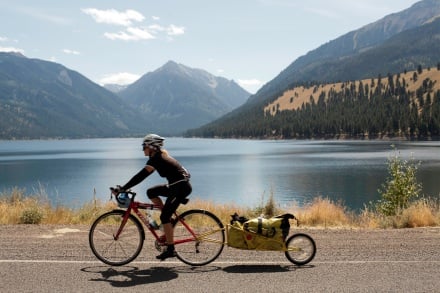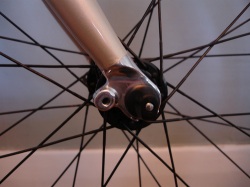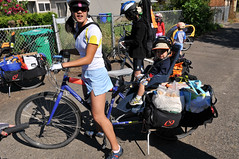
(Photo: Daniel Sharp)
If the thought of loading your bike with camping gear and heading out for the weekend into the wild blue yonder seems like a faraway dream, we’re here to help. You don’t actually need fancy gear or a special bike. Even if you’ve never toured before it’s easy to convert the bicycle you’re riding now for overnight touring the many beautiful country roads surrounding Portland.
The good news is that you don’t have to run out and buy a special bike to do a multi-day, self-supported tour. Chances are the bike you’ve got will work just fine. Check out some tips and resources below and you’ll be ready for the open road.
Hybrids/Older Mountain Bikes

(Photo © J. Maus)
Mountain bikes and hybrids work well because they’ve got plenty of room for racks and fenders and you’ll have very low gearing. Having a three chain rings (the gears in the front) will give you one very easy option for getting up hills. Older mountain bikes without front or rear suspension work best for pedaling efficiency and rack mounting. Remember to swap out knobbies for slicks before you hit the road.
Road Bikes

(Photo © J. Maus)
Depending on how fancy it is, you can attach a trailer to most any road bike and a few can even take racks. Most road bikes have higher (harder to pedal) gearing which make it more challenging to travel. Consider finding a bike with three chain rings if your route includes any significant hills.
Longtails
Longtail cargo bikes like Xtracycles have become ubiquitous around Portland; but they also make perfect touring machines. The long wheelbase provides stability and the side bags give you lots of room to store your bedroll, food, and other touring essentials. For family touring, longtails might be the perfect option.
Loading it Up
Racks
Rear racks are usually the preferred method by beginning travelers because of convenience and stability. However, carrying weight over your rear wheel can increase flats and spoke breakage. Some folks spread the weight out by using a front rack as well.
Racks can be attached in two ways. Your bike may come with eyelets that bolts can easily thread into, or you can use rubber coated hose clamps which are easily found at hardware stores to fashion one on. If you use this method, make sure the clamps are very secure.

power of a milk crate.
You can install racks on most bikes and don’t necessarily need to spend money on panniers (the bags that attach to the sides) if you strap a milk crate or soft backpacking pack on top. The weight carried high can be unstable, so pack carefully!
Panniers advantage is being able to carry your load much lower, which increases stability. Consider borrowing some or purchasing an inexpensive set, or making some out of waterproof buckets.
Trailers

Trailers are a good option for people with bikes that don’t easily take racks by attaching to the frame or through the center of the rear axle. They keep the weight off your rear wheel and have less wind resistance, but can decrease stability at high speeds, add the weight of the trailer to your load and increase overall drag.
Getting A Little More Comfortable
Take Care
Your bike needs to be in tip-top shape. A trip being cut short by mechanical troubles is never fun — and it may take a while for that ride back.
Getting to the Bottom
Make sure your saddle is tested over long hours. Sporty bike shorts with padding (chamois) help ease soreness, but for trips without them try to wear breathable fabrics that wick moisture away. Chamois cream or lotion to ease chafing might also be something to consider.
Over the Hill
Consider the number of gears you’ll need. You may have noticed much of the Pacific Northwest is mountainous, and you’ll be adding 25-50lbs of weight to your ride. Your gearing choice can make the difference between riding and pushing your bike up those hills and can protect you from injury.
Fenders
Hey, it rains here! They can make a wet day much more bearable.
Tires
A wider tire (over 1-inch or 28c) can make for a smoother, more stable ride. Investing in a Kevlar tread is your first defense against flats — but before you head out, make sure you know how to change a tube!
Water
You must drink and there may not be places to stop. Install 2-3 water bottle cages, or carry a bladder on your back or bike.
Handle It
Handlebar bags make it easy to get to snacks and maps. They range from fancy to hand-made — I found my last one in a used bike shop for a dollar!
Check it Out
When you’re on the road, oil your chain and air up the tires daily. This gives you a chance to look the bike over and make sure all looks sound and keeps your ride smooth.
In the end, just remember to not let your lack of a “real” touring bike keep you from enjoying the thrill and satisfaction of self-supported touring. For a bit more inspiration, check out a great upcoming event on August 2nd, DIY Cycling Adventures with Michael Sylvester.
Other Resources
Now that your bike is ready, here are some resources on what to bring and where to go.
— Cycle Wild: A Portland non-profit with a mission to reconnect people to nature via the bicycle. They organize group trips in the Portland “rideshed” as well as touring education and support.
— PBOT Regional Maps: The City has some great maps available for overnight options from Portland.
— Cycling Sojourner: This inspiring blog details Portland author Ellee Thalheimer’s bike touring adventures — including rides around Portland that make great beginner tours and inspiration to see more of our great state on two wheels.
— Bicycle Touring 101: A website that offers touring options, advice and opinions. Another great resource for what to bring and creative ways to convert your bike.
— Cycle Oregon: This non-profit offers superlative supported group rides, but check out the past routes (with maps!) for great destinations throughout the state.
— Tori Bortman is the owner of Portland-based Gracie’s Wrench, a business that offers individual and group bike repair classes tailored to your needs. Want more tips? Check out Tori’s past columns in the archives.


